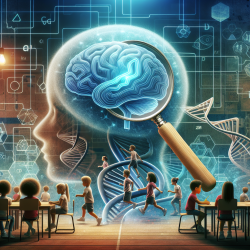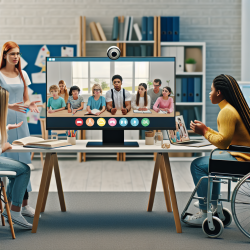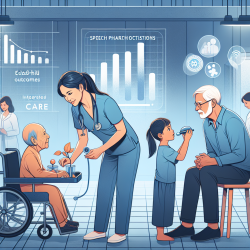Understanding 12q12 Duplications and Their Impact on Neurodevelopmental Disorders
In the ever-evolving field of special education and therapy, staying informed about the latest genetic research can significantly enhance the support we provide to students with neurodevelopmental disorders (NDDs). The recent study titled "Variable neurodevelopmental and morphological phenotypes of carriers with 12q12 duplications" by Myers et al. (2020) offers valuable insights into a rare genetic aberration that may increase the risk for developing NDDs.
Key Findings from the Research
The study focuses on the phenotypic description of individuals carrying duplications in the 12q12 region of chromosome 12. This research highlights the following key findings:
- Individuals with 12q12 duplications often exhibit language and cognitive delays.
- Many of the duplication carriers were diagnosed with autism spectrum disorder (ASD).
- Distinct physical features, such as high foreheads, deeply set eyes, and abnormalities in the digits, were observed.
- There is incomplete penetrance of NDD phenotypes, meaning not all carriers exhibit the same level of symptoms.
Implications for Practitioners
For practitioners in the field of special education and therapy, understanding the implications of 12q12 duplications is crucial for several reasons:
- Early Identification: Recognizing the physical and cognitive markers associated with 12q12 duplications can lead to earlier identification and intervention for affected individuals.
- Personalized Interventions: Knowledge of specific genetic factors allows for more tailored interventions that address the unique needs of each student.
- Collaboration with Geneticists: Practitioners can collaborate more effectively with geneticists and medical professionals to develop comprehensive care plans.
Encouraging Further Research
The findings from this study underscore the importance of continued research in the field of genetics and neurodevelopmental disorders. Practitioners are encouraged to stay informed and consider the following actions:
- Engage in Professional Development: Attend conferences, webinars, and workshops that focus on the latest genetic research and its implications for special education.
- Participate in Research Studies: Collaborate with research institutions to contribute to studies that explore the genetic underpinnings of NDDs.
- Advocate for Genetic Testing: Encourage families to consider genetic testing when appropriate, as it can provide valuable insights into the needs of their children.
To read the original research paper, please follow this link: Variable neurodevelopmental and morphological phenotypes of carriers with 12q12 duplications.










